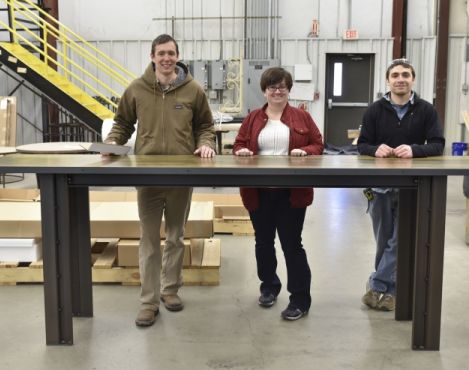SEATTLE, 2015-2-24 — /EPR Retail News/ — A group of Army Reservists in uniform sit around a community table in a Starbucks near a military base. With coffee cups close, they pour over planning papers. Their attention is focused on the task at hand; unaware the large table they’re using was handmade in the U.S.A.
The table, with a smooth maple top and sturdy steel legs, comes from the Blue Ridge Mountains of North Carolina and is one of 27 Starbucks has purchased for its community stores. Though the order might seem small for a global company, it is one of the ways Starbucks exhibits its commitment to locally-relevant design using sustainable materials. And getting an order for a couple dozen handcrafted tables can make a big difference for a small company.
Sourcing managers with the Starbucks Global Store Development team are always looking for high-quality, handmade furniture. They discovered Charleston Forge a couple of years ago. The family-owned business employs about 40 people who design, fabricate and finish furniture using suppliers who are within a 100-mile radius of Boone, North Carolina.
“We love to see ‘outsiders’ take an interest in our businesses,” said Dan Meyer, President of the Boone Area Chamber of Commerce. “One of our concerns here is underemployment. When companies like Starbucks support our businesses that enables families to provide for themselves for the generations to come.”
Charleston Forge is grounded in the persistence of its founders, Art and Susan Barber. In their 20s, after graduating from Appalachian State University, they opened a retail fireplace shop to cater to people who had homes in the Blue Ridge Mountains – the highest mountains east of the Mississippi River. Art hand forged a baker’s rack and other furniture pieces out of metal to help display the bellows and other fireplace equipment sold in their store.
In the mid-1980s, a customer suggested the Barbers take their handmade furniture to the High Point Market – the largest home furnishings trade show in the world, encompassing over 10 million square feet of display space, in High Point, North Carolina.
“To make a long story short”
“Well, actually I can’t make a long story short,” quipped Art. “I loaded my 1978 pickup up with furniture and got to High Point the night before the trade show opened. I was told ‘I’m sorry, you’re too late.’ And I was turned away.”
Art and Susan were in their 20s, $300,000 in debt, with a newborn baby at home at the time. Now what? Art “walked up and down the hall in a panicked state” thinking their dream of starting a furniture business had ended. With nothing to lose, Art found a tucked-away corner of one of the massive showrooms and began setting up his furniture on a rug he’d borrowed. He stood there for 10 days, hoping to attract the attention of buyers while avoiding security guards.
One buyer took notice of Art and purchased a baker’s rack. Six months later, a piece of furniture Art created was on the inside front cover of a preeminent catalog retailer, and Charleston Forge had its start.
“Some of the artisans who hand forge or hand paint and stain our furniture have been with us almost since the beginning,” said Susan. “Like many furniture companies we were hard hit a decade ago as overseas production took over. Over the past several years we’ve seen a return to American-made furniture because of the quality.”
Handcrafted furniture
Every piece of furniture Charleston Forge produces is handcrafted. From combining age-old blacksmithing techniques with new technology, to welding steel and applying premium finishes by hand, each piece is built to order in Boone, a college town of about 18,000 people. The company also mentors design students at one of the local colleges.
“We are always looking for unique pieces from suppliers who are able to bring opportunity into their communities by creating jobs,” said Michelle Lundell, senior sourcing manager for Starbucks Store Development. “Charleston Forge is also training people in hand craftsmanship skills that otherwise might be lost.”
With 18 in-house design studios, Starbucks is able to integrate local relevancy and sustainability into store designs around the globe.
For more information on this news release, contact the Starbucks Newsroom.
###
